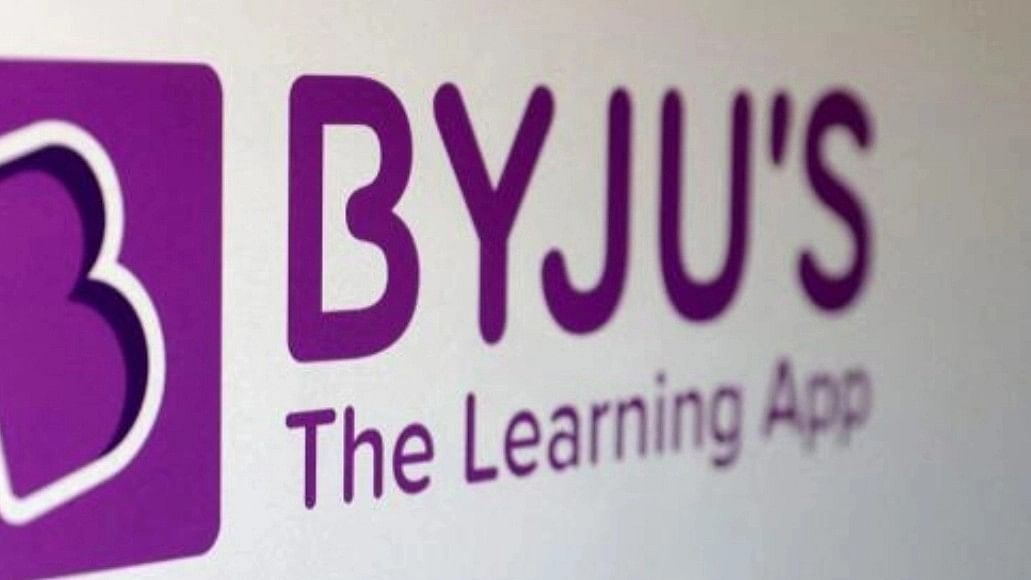
The Byju's logo.
Credit: Reuters Photo
Bengaluru/New Delhi: The insolvency of Indian education technology company Byju's threatens to be the biggest upset in a celebrated startup sector, unleashing a long battle by thousands of panic-stricken employees to recover dues and protect their careers.
Once a darling of global investors, valued at $22 billion in 2022, Byju's became popular by offering online training courses during the Covid-19 pandemic, but is now locked in a dispute with US lenders seeking $1 billion in unpaid dues.
Reuters interviews with dozens of its employees, parents of students and a review of WhatsApp chats show a growing sense of desperation as people plan to take the offensive against the company whose board stands suspended with assets frozen.
"A lot of people, including myself, have stopped taking classes because there's no point doing charity for the company anymore," Sukirti Mishra, 29, said on a conference call with Reuters held by about 60 employees of Byju's unit WhiteHat Jr.
Mishra, who once earned $1,200 a month teaching mathematics courses, now faces the anger of parents after she halted classes for their children, she said on the call attended by Reuters.
But she herself is struggling to pay medical bills and loans installments, after having gone unpaid for months.
Byju's, which is battling the insolvency move in court to try and regain control, did not respond to Reuters' queries. In court papers it has warned of a total shutdown of services as the insolvency proceeds.
India's Supreme Court is set to hold on Thursday its next hearing in the insolvency process it allowed to continue last week, when it sided with the protesting US lenders.
After three months without pay, many of Byju's 27,000 employees are considering street protests or lawsuits.
Since a court-appointed officer took charge of the company, about 3,000 of them have filed claims, providing bank statements as proof, said one senior company executive, who spoke on condition of anonymity.
"I guarantee this: When we regain control, your salaries will be paid promptly," company founder and former billionaire Byju Raveendran assured staff this week in an internal memo seen by Reuters.
Employees face a long road ahead as it could take months to find a new buyer, or liquidate Byju's assets. And the law gives no guarantee that employees and teachers can recover all their dues in the end.
Byju's, started in 2011, has suffered numerous setbacks in recent months, from boardroom exits and criticism over delayed financial disclosures to an auditor resignation.
Investors such as Dutch technology investor Prosus accused Raveendran of mismanagement in disputes that became public, though the executive has denied wrongdoing.
Anxiety in WhatsApp Groups
If the insolvency process continues, it is set to be the biggest among India's tech startups, a sector that has attracted the likes of SoftBank and Tiger Global over the years.
About 280 employees of Byju's have approached a state grievance panel to demand action on unpaid salaries, accusing the firm of not paying to the government the taxes it deducted from their salaries.
"We are deeply concerned about the company's financial stability ... our fear (is) that the company may be planning to shut down operations without settling our dues," they said in a letter on Aug. 5.
Reuters reporters were also invited to three WhatsApp groups with a total membership of more than 2,200 affected employees and parents, all scrambling to recover their money.
The groups discuss possible next steps, trying to decide whether campaigns on social media, street protests or legal action will best help them.
Byju's, which offers services in 21 countries and has 150 million students as members, typically prices its programs from $100 to $300, many sold on loans.
To drum up attention, parents, worried mostly about clawing back their payments, have even discussed tagging former Byju's brand ambassadors, such as Argentine soccer star Lionel Messi.
"We should post on Instagram," said one user in the WhatsApp group for parents. "We can tag them and show them the reality."
For now, Raveendran is betting against the odds.
"Our company is on the verge of reversing the negative business cycle that began two years ago, showing clear signs of recovery," he told staff in a memo on Tuesday.